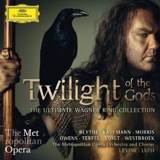|
|
|
|
|
|
|
|
| International Record Review, December 2012 |
| Mark Pullinger |
|
|
|
Wagner - Twilight of the Gods |
|
|
 The
cover of 'Twilight of the Gods' features Bryn Terfel brooding darkly, a
raven perched on his shoulder. Twilight of the Gods? The
cover of 'Twilight of the Gods' features Bryn Terfel brooding darkly, a
raven perched on his shoulder. Twilight of the Gods?
But isn't Wotan
out of the picture by Götterdämmerung? Despite the title, this two-disc set
is a collection of bleeding chunks, a veritable abattoir, if you please,
taken from the Metropolitan Opera's new Ring cycle.
Robert Lepage's
new production has been controversial, dominated by his 'machine' which
draws admirers and detractors in equal measure. It certainly makes quite a
few creaks and clicks in some of the softer music, but it isn't too
distracting as most of the microphone placements seem to focus on the
orchestra and individual singers. Indeed, I've rarely heard a live Wagner
opera recording where singers are never submerged by the pit and orchestral
details — such as the harps as the gods approach Valhalla — are so clear.
The anvils are deafening and there is a big, fat brass sound.
Two
conductors are engaged: James Levine for Das Rheingold and Die Walküre,
before his indisposition made way for Fabio Luisi in Siegfried and
Götterdämmerung. It's interesting to bear in mind Levine's previous Met
stewardship of the Ring (also for DG). His Rhine flows rather quicker here,
the rainbow bridge is traversed more swiftly and his 'Ride of the Valkyries'
is taken at a good canter too (with a hint of audience applause for the
set). Luisi also favours quick tempos, although he also encourages lighter,
more springy, less emphatic playing from the Met Orchestra, especially
appropriate for Siegfried, the scherzo of the tetralogy.
Terfel is
the finest Wotan before us now. His word-painting is superb (much more so
than with James Morris, Levine's earlier Wotan) and his refulgent tone makes
him sound every inch a god.
The voice has coarsened somewhat, but
that slight graininess is entirely in keeping with the character. His
'Abschied' contains some glorious singing, so it's galling to report a
sudden fade before the Magic Fire Music suddenly bursts in. The first disc
does run to 81 minutes, but one couldn't help wondering if something else
could have been forsaken to include the last
quarter of an hour of
Walküre uncut.
The Rhinemaidens are an attractive, well-blended trio
and Stephanie Blythe's brief appearances as Fricka find her in superb voice.
Eric Owens might not be as sardonic an Alberich as Ekkehard Wlaschiha on
Levine's earlier recording but is in commanding voice in Alberich's great
curse. Incidentally, Dwayne Croft has to be one of the best Donners I've
heard in recent years, his heroic baritone launching the finale of Rheingold
magnificently. Eva-Maria Westbroek's Sieglinde is sometimes tremulous on
high notes, but Jonas Kaufmann is extraordinary as Siegmund; the
velvety-chocolate depths to his baritonal-tenor and his aristocratic
phrasing in the very generous section from 'Winterstürme' to the end of Act
1 of Walküre is worth the cost of the set alone.
Deborah
Voigt is not the loudest Brünnhilde on record but sounds girlish in Walküre
and is note-accurate, although sometimes a little pinched at the top of her
range. Sadly, in Siegfried she is too matronly —well, she is Siegfried's
aunt — and her final C is a bit of a shriek. Ironically, she sounds in much
fresher voice in a decent immolation scene in Götterdämmerung. Siegfried
offers the least satisfying set of vocal performances. Jay Hunter Morris,
stepping in for Gary Lehman in the title role, is a bit stretched in such a
large house. He lacks the sheer heft of a Heldentenor and in the Forging
Scene is in danger of being outsung by Gerhard Siegel's excellent Mime. He
does have stamina, however, and presents a likeable enough hero. Mojca
Erdmann's Woodbird is a little thin-toned.
Götterdämmerung features
the bitter Hagen of Hans-Peter Konig and some thrilling singing from the men
of the Met Chorus. Applause is retained after some excerpts. It's difficult
to identify the intended audience for this release. Committed Wagnerites
will have their favourite complete cycles on disc and DVD and probably
wouldn't countenance a mere selection of edited highlights. The complete
cycle has recently appeared on DVD and Blu-ray, so this could be treated as
a sampler, or perhaps as a memento for those who have seen it, either live
or via cinema screenings. Perhaps it's meant to snare new converts to Wagner
DG's presentation would seem to suggest this, with glossy photos and an
unbelievably superficial booklet note: 'The Ring in later mythologies' has
Mike Ashman spending two tortuous pages drawing comparisons between Wagner's
tetralogy and Tolkien's Lord of the Rings and the Star Wars franchise.
'Scraping the barrel' comes to mind.
The entire cast of the Ring is
listed in the booklet, despite the fact that we never hear a note from the
Norns or from Waltraud Meier's Waltraute, Franz-Josef Selig's Fasolt or
Wendy Bryn
Harmer's Freia. Four Rhinemaidens are credited, which I
cannot begin to fathom unless the recording of Das Rheingold took place over
more than one performance. If this release does attract new listeners, they
will find precious little in the documentation to guide them through
Wagner's world of gods, dwarfs, dragons and Rhinemaidens. Not only are there
no texts or
translations (an instant black mark on this Beckmesser's
slate) but there isn't even a synopsis to give a clue as to what the story
is about. Booklet editor Jochen Rudelt should be immediately exiled to
Nibelheim! |
|
|
|
|
|
|
|
|
|
|
|
|
|
|
|
|
|
|